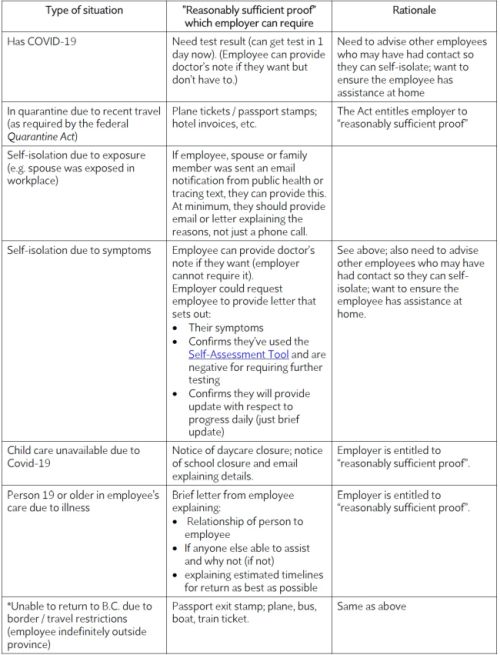The B.C. government has made amendments to the Employment Standards Act (the "Act") which received assent on March 23, 2020. Further amendments were announced on May 4, 2020. Perhaps the greyest area here is the proof employers may be able to require from employees when they claim leave due to COVID-19 related situations. We address that issue at the conclusion of this post with some options.
The amendments address:
- Extending the definition of "temporary lay off" from 13 weeks to 16 weeks.
- At Section 49.1, adding the right for employees (who have greater than 90 days of employment with one employer) to have up to 3 days of unpaid sick leave.
- At Section 52.12, the addition of a COVID-19 related leave.
Key elements of the changes are set out below.
Lay Off Extension
- The definition of "temporary layoff” is extended from 13 to 16 weeks.
- This is not a permanent provision. It will be repealed when no longer required, as announced in the government's news bulletin.
- There is still no right of layoff.
- Employers need employee consent or contractual authority.
Three Unpaid Sick Days
- This is a permanent change to the Act.
- After 90 consecutive days of employment, an employee is entitled to up to 3 days of unpaid leave in each employment year for personal illness or injury.
- The employer may request "reasonably sufficient proof" that the employee is entitled to this leave.
COVID-19 Related Leave
- An unpaid but protected leave.
- Applies to any of the following situations:
- An employee who has been diagnosed with COVID-19.
- An employee in "quarantine" or
"self-isolation" in accordance with:
- Order of the provincial health officer.
- Order made under Quarantine Act (Canada).
- Guidelines of the B.C. Centre for Disease Control.
- Guidelines of the Public Health Agency of Canada.
- An employee who, due to the employer’s concern about the employee’s exposure to others, has directed the employee not to work.
- An employee providing care to an "eligible person".
- Child under day-to-day care of the employee when child care facilities/schools are closed.
- Person 19 years of age or older who is ill and under the employee's care.
- An employee outside the province who cannot return to B.C. due to travel / international border restrictions.
- The employer may request "reasonably sufficient proof" that these situations apply.
- Not required to provide a note from a medical practitioner.
- This leave basically lasts for as long as any of the prescribed situations listed above are extant.
Trust between employers and employees is going to be a big part of this phased return during the pandemic. This relationship of trust is the basis of any employment relationship.
In the absence of perfect objective proof of a person being legitimately absent pursuant to the above, the employer will have to make judgment calls. This is especially the case because the legislation specifically prohibits the ability to require a doctor's note for any of the scenarios.
However, in advance of having to make that judgment call, it would be prudent to set the policy clearly explaining the entitlements under Section 52.2 and for each scenario requesting that the employee provide as much information as they can.
So, what is considered "reasonably sufficient proof of absence", and still falls within the bounds of privacy obligations employers have to employees? We make some suggestions in the table below. Again, much of this relationship will be based on trust. However, it is reasonable for an employer to request some form of email or attestation or other reasonable evidence. Although this evidence may not be complete proof of legitimate absence, it still provides some accountability from the employee.
Possible policies for different COVID-19 Leave Requests – These are suggestions

- Employees, who at this time desire to travel internationally, should advise the employer of the reasons for that travel. If the reasons are anything other than to take care of an ill or dying family member or take care of estate issues then the employer needs to have a policy as to whether any leaves will be supported on their return.
- Employees should also be advised employers will not support paid or unpaid leaves if employees are in breach of public health orders, the Quarantine Act, or any other orders existing in their location.
- Employers should update their disciplinary policies accordingly.
The content of this article is intended to provide a general guide to the subject matter. Specialist advice should be sought about your specific circumstances.


